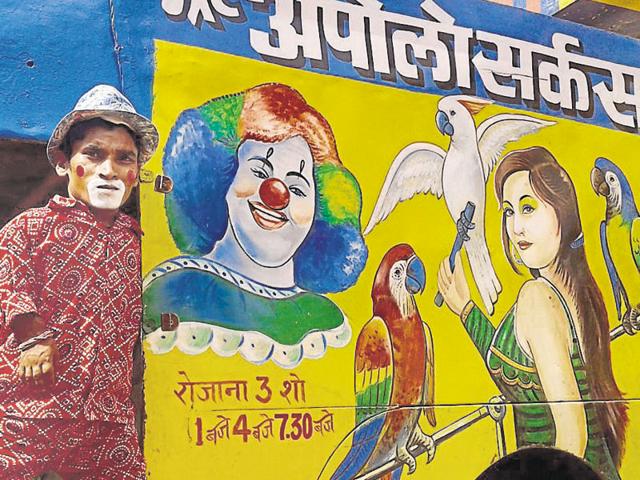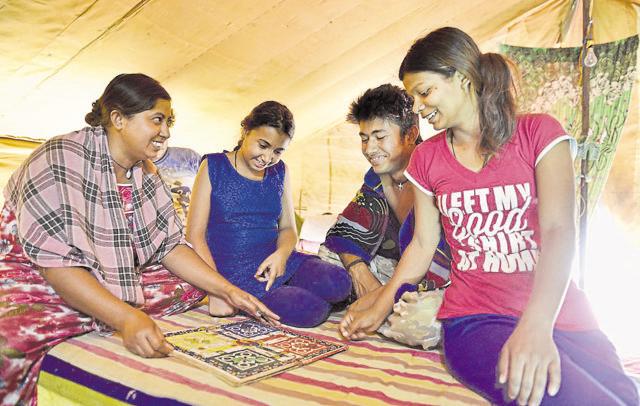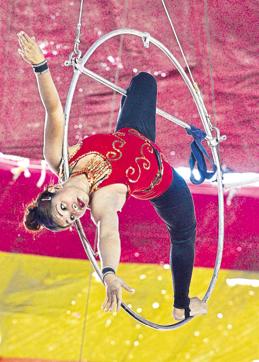No animals, no child artistes, only nostalgia; the circus is dying
It is a familiar setting. The audience waits with bated breath as the ringmaster performs his most awe-inspiring act. As he successfully puts his head inside the tiger’s mouth, the crowd breaks into applause, cheering loudly.
It is a familiar setting. The audience waits with bated breath as the ringmaster performs his most awe-inspiring act. As he successfully puts his head inside the tiger’s mouth, the crowd breaks into applause, cheering loudly.

Cut to now, there is no tiger and hardly any crowd. First day, first show. More than 40 performers. Nearly 30 backstage crew. Over 1,000 seats. And only seven viewers. Apollo Circus is in town.
The 130-year-old tradition of the Indian circus is dying as people move onto more varied forms of entertainment. And there’s no dearth of it outside the patched and faded tent.
“The circus doesn’t have takers anymore because of the animal ban. Earlier circuses would compete with each other on the basis of the number and variety of animals they showcased. We had four elephants, all of whom are at the maalik’s farmhouse now. If we get our animals back, then we get our honour back,” says Anil Kumar Sharma, manager, who hails from Jabalpur and left a lucrative job in Delhi 15 years back to travel with the Great Apollo Circus, whose Punjab and Haryana branch is stationed in Chandigarh for a month.

“We are able to cover our losses in small towns and villages. Sometimes, we have to pay from our own pockets but food, electricity and water is taken care of by the owner,” he says, adding, “The Indira Gandhi sarkar was very kind to us, but the daughter-in-law (refers to animal activist Maneka Gandhi) has made it increasingly difficult for us to survive.”
Always gracious
Masterji Ashu John graciously acknowledges a crowd that doesn’t exist. His ‘Russian Lattu’ act is as perfect as ever, but there’s hardly anyone to appreciate it. “I grew up in the circus. My father was a musician in the circus but I wanted to learn other acts. I was so fascinated that I never thought of doing anything else,” says the 34-year-old from Farooqabad in UP.
In the age of reality talent and stunt shows, why do circus performers not take a shot at the same? “We never really got the opportunity as such. The queues are unending and the wait unnerving. Apart from that, as you can well see, I’m a dwarf,” laughs 24-year-old Ravi, who plays the joker, adding, “I thought since people laughed at me all the time, it’d be a good idea to make them laugh. I’m more comfortable here than anywhere else.”
One big family
Performing to a peppy number, the pixie-like ring girl awes one and all by spinning to 10-15 rings around her slim waist. It’s no biggie. Ruksar, 20, is a Bihari Muslim married to Masterji’s younger brother Ishu. In a world obsessed with race and religion, it’s hard to believe that such barriers don’t exist here.

“We are like a big family. We have a single identity as circus performers and yet we thrive as individuals. I was born in the circus and grew up in it, so it’s obvious that my partner would belong here too,” says Ruksar John.
Masterji’s family is busy playing ludo inside their tent. When asked how the entertainers entertain themselves, Munmun, Masterji’s wife, promptly says, “Television, of course. And we also go out to watch movies sometimes.” Munmun belongs to Kolkata and specialises in the balancing act. She says, “I was working for the Asian Circus when I met Ashu. In a way, this is my ‘sasural’ (in-laws’ house).”
Safe haven for women
Doesn’t the ‘banjara’ life become difficult for women in the circus? “No, not at all. Girls are safer here than they are outside or even at home. We are extremely well-cared for and given our privacy,” says Ruksar.

“My baby was born while I was travelling in the circus. The owner was very kind to me and everyone else too. They gave me good food, took me for regular check-ups and now help me raise my baby too,” says 21-year-old Preeti, who is nursing one and a half year old Amrit as she speaks. Preeti hails from Surat in Gujarat and is married to the drummer of the circus, Raju, 26.
Hope abounds
Even as the end looms large for these happy-go-lucky banjaras, they haven’t lost hope. Love for their art and wanderlust tops everything else. Any express wish?
Munmun says, “Mumbai jaana hai aur Shah Rukh Khan se milna hai (I want to go to Mumbai and meet Shah Rukh Khan). I am a huge fan and I want to tell him our story, so he can make a movie on us.”

It’s ironic that Shah Rukh Khan shot to fame for his two early TV serials, one of which was Circus, a show based on the life of circus performers.
That was in 1989 and this is 2016. At a time when entertainment is a constant shape-shifter, maybe it would take a Shah Rukh Khan to once again save the very circus he wanted to sell off.





